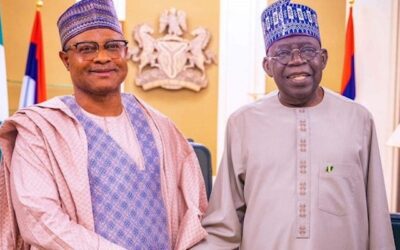Shamsudden Usman and the LSE: Inspiring Integrity and Values-Based Leadership

Imagine somewhere probably in the naked clouds where ideas that can literally generate cutting-edge results can be moulded. Results, when fully baked, will incite smiles and great satisfaction across business and political circles in virtually all regions of the world. Don’t think too far.
It is a place where the minds of thousands of change-makers, influencers, and leaders that make profound impact have been moulded in the past 126 years. It is the London School of Economics (LSE)
A school that has produced the highest number of billionaires, like George Soros as well as several Central Bank Governors, including globally acclaimed economists like Janet Yellen, Stanley Fischer, Mervin King, and Paul Volker
The Guardian of the UK once reported that the LSE is a school whose political clout is “closely wired into parliament, Whitehall and the Bank of England”
LSE’s huge impact is not limited to the developed world. Coming closer home, the school has produced 2 Kenyan Presidents, including Jomo Kenyatta, and 3 Ghanian Presidents, including Kwame Nkurumah. Notable Nigerians, including statesmen and public figures like Obafemi Awolowo, Ibrahim Gambari and our current Vice President, Yemi Osinbajo were all moulded at the London School of Economics.
Outside government and political circles, eminent bankers like Subomi Balogun, Pascal Dozie, Atedo Peterside, Aig Imoukhuede, Bolaji Balogun, and Ubadigbo Okonkwo were all “manufactured” at the London School of Economics. Other notable alumni are Bayo Kuku, Tunde Folawiyo, Salamatu Sulaiman, Kingsley Moghalu, Garba Donli, etc. Nigerians who have served with knowledge, integrity, and humility in different areas of human endeavours.
LSE has over 155,000 Alumni from virtually all regions of the globe who are active in almost all sectors of the economy and the society. An Alumni that include 55 past and current Heads of State (including late President J. F. Kennedy) and 18 Nobel Prize winners.
Read Also: ‘A JOURNEY IN LEADERSHIP’ – TIJJANI BORODO
The LSE Alumni Association Nigeria is the official alumni association of the London School of Economics and Political Science in Nigeria. Events are organised regularly for members to network with other alumni and share experiences. One such event is the Abuja LSE Talks that will be anchored regularly by the Abuja Chapter. The maiden edition was graciously hosted in Abuja by the British High Commissioner to Nigeria, Catriona Laing.
The task of inspiring the elite alumni group in the maiden edition of the talk fell on Nigeria’s former Minister for National Planning and fellow alumni of the school, Dr . Shamsuddeen Usman.
For alumni who may feel entitled, carrying a chip of the school’s chain of successes on their shoulders, the expectation was probably an ego massaging presentation that would reinforce their sense of superiority. However vintage Shamsuddeen Usman was up to something else that would create a sobering impact on his audience.

As he began his presentation, Usman stated, “If you are an Alumnus of this school, you may feel entitled and carry a chip on your shoulders. But you shouldn’t and you mustn’t. That’s my first piece of advice today.
” If you look at the lives of virtually all of the famous LSE Alumni outlined above, they dedicated their lives to service, with humility”
Digging deep into the history of the school, he highlighted the vast majority of LSE Alumni who served or are serving with integrity. He also highlighted a few misguided LSE Alumni including Saif al-Islam, the son of Muammar Gaddafi, Monica Lewinsky who had illicit affair with Ex-President Bill Clinton, and Omar Saeed Sheikh, who was found guilty and convicted of terrorism.
Usman subsequently told the alumni the two available choices. They were to choose between the list of those that served with integrity or those that wallowed in controversies. His words: “My second advice today is, therefore: Serve with integrity as I am sure you do not want to join this small list of infamous LSE Alumni. The reward for behaving with integrity is manifold”.
The call for a relentless pursuit of knowledge was also emphasised by Dr. Usman. He explains further, “The key objective of why we all went to the LSE, was to acquire knowledge.
“LSE is, of course, a leading light in this regard, as defined by its motto “Rerum cognoscere causas” – ‘to learn the causes of things. What therefore one expects of Alumni that have gone through LSE and have had LSE go through them, is a persistent and lifelong quest to learn the causes of things; a persistent and lifelong quest for knowledge.
“My third advice today is, therefore: Have a life-long quest to know the causes of things, and My fourth advice is: Have a life-long quest to solve any challenges that arising therefrom.”
The character of reasoning and accommodating divergent views was another area Dr. Usman emphasised strongly. He urged all alumni members to willingly accommodate and engage, at the intellectual level, with alternative views.
“My fifth advice today is: Be open-minded, especially, on the need to hear the other side” Usman Stressed. “Among my own teachers at the LSE in the late 70s, for example, we had left-wing leaning people, like Professors Desai and Amartya Sen, juxtaposed with more right-wing leaning Professors, such as Alan Prest and Richard Layard.
“What is amazing is to hear, several years after is that both Professors Desai and Richard Layard ended up as members of the U.K. House of Lords”.
It is obvious that Dr . Shamsuddeen Usman’s presentation was designed to challenge the alumni to think about the major challenges facing society, as well as the potential solutions each person can generate within his sphere of influence. Hopefully, it provided the needed stimulus for new and innovative ways of thinking the new LSE Talks was designed to infuse in the alumni to enable members make decisions that will always produce results.
Even the guest speaker at that maiden edition, Dr. Usman also opined that the platform of the Abuja LSE Talks that he inaugurated, will provide a unique opportunity for continuous and lifelong learning, not only to the LSE Alumni but to the wider society as well.


